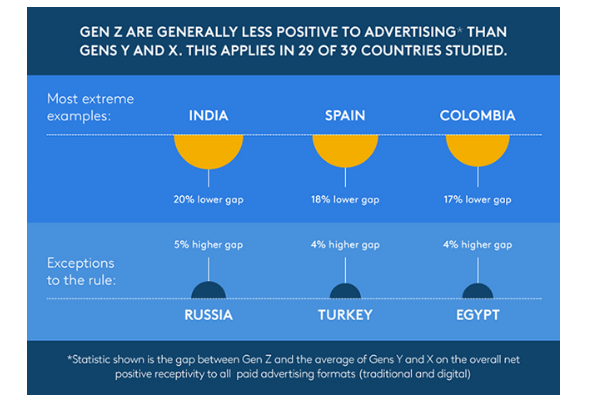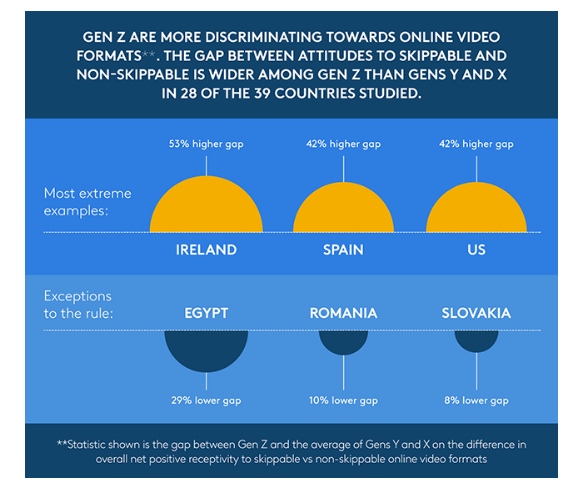 The latest challenge facing marketers is to connect with the mobile-first Gen Z, typically defined as people born after 1997, so currently those under the age of 20. But just because they grew up with a smartphone in their hands does not mean Gen Z is totally different from their predecessors. Marketers must take account of both similarities and differences in crafting their approach to this new generation.
The latest challenge facing marketers is to connect with the mobile-first Gen Z, typically defined as people born after 1997, so currently those under the age of 20. But just because they grew up with a smartphone in their hands does not mean Gen Z is totally different from their predecessors. Marketers must take account of both similarities and differences in crafting their approach to this new generation.
When a new generation comes of age, marketers are faced with the challenge of reaching and engaging a new audience, so it’s important to understand their likes and dislikes to different forms of communication. And although the world is increasingly connected, we cannot simply assume that Gen Z is a cohesive and consistent global cohort. In order to connect with Gen Z effectively marketers must be prepared to flex their communication strategy not just by age but by country.
Don’t assume differences, because if you assume…
Gen Z are not an alien species. In fact, the AdReaction: Gen X, Y and Z study found their attitudes are remarkably similar to older generations. Based on previously published US qualitative research, we expected to hear how “honest and real” content was of great importance to Gen Z around the world. We did, but it was also important to previous generations. This global “non-finding” also belies some fascinating variation across countries. In the US, Hong Kong, and Germany, Gen Z genuinely do value honesty much more than their predecessors. But this is counter-balanced by other countries, most notably Saudi Arabia, Philippines and Vietnam, where honesty is more of a concern to older consumers and less important to Gen Z.
We had also assumed that Gen Z would be more liberal in their outlook on life, but globally we saw no more of Gen Z claim to embrace diversity and individuality than we did among Gen Y (Millennials) and Gen X (Baby Busters). We also found that even though Gen Z have grown up with smartphones they are not necessarily more advanced in their technical capabilities. We spoke to very sophisticated and less sophisticated online users in all generations so don’t assume that your marketing needs to be technically complex to impress this new audience.
Don’t generalise generations
There are some generational differences which are very significant globally, but even here we need to understand that these rules of thumb don’t necessarily apply everywhere.
Gen Z clearly are heavier users of mobile devices than Gens Y and X. This is true in 32 of the 39 countries studied, especially in the Netherlands, Slovakia and Belgium. The small number of counter-examples includes the Philippines, Saudi Arabia and Thailand.

Gen Z are usually less positive to advertising than Gens Y and X. This applies in 29 of the 39 countries studied, especially India, Spain and Colombia. The implication here is that most marketers will need to improve the quality of their placements and content, or risk a reduced return on marketing investment in the years ahead. This lower positivity applied to most ad formats, including TV, radio and digital, but Gen Z are no less positive towards billboards, and slightly more positive towards cinema ads and product placements than earlier generations.
Overall, Gen Z are more discriminating towards online video formats. All generations are more positive towards skippable than non-skippable video, but this gap is particularly wide among Gen Z. This is true in 28 of the 39 countries studied, especially so in Ireland, Spain and the US. Our advice to marketers everywhere is to stop using invasive video formats; Gen Z’s attitudes should just further sharpen this focus.

Beyond their overall receptivity levels, we also see that engaging Generation Z is generally a challenge. They are more likely than older generations to skip ads whenever they can in the majority of countries studied, especially so in Japan, Netherlands and the US. Youth marketers in those countries will need to work especially hard to design skip-resistant content which intrigues early and talks to a Gen Z perspective. However, Gen Z are less likely to claim to skip in Korea, Philippines and South Africa; this significant difference between Japan and Korea highlights that geographical proximity is no guarantee of similar findings when it comes to generational variations.
Conclusion
Marketers should embrace the importance of similarities not just differences between generations, because understanding similarities can prevent brands from making false assumptions about how much marketing needs to change. For example, youth marketers should probably not be moving spend away from outdoor ads since they appeal equally well to all generations. Finally, even the most clear cut generational differences need to be put into a local context because we see significant variations by country. With this sensitive and nuanced appreciation of the variations, generational insights can be useful for planning and developing engaging media and content.
Written by Duncan Southgate,Global Brand Director, Digital Millward Brown Digital

